Professional Development
Welcome to Work It With Juan! It’s professional development with a twist!
Hosted by Juan Macias, MSW '02, and featuring alumni guests, “Work It With Juan” is a video web series developed for social work and nursing professionals to provide you with expertise to help you stay up-to-date with your practice and grow your career. Find additional information, tools, resources and interviews after you watch the episode. From resume best practices and interviewing skills to licensure and job transitioning, “Work It With Juan” prepares you for the next step in your career.
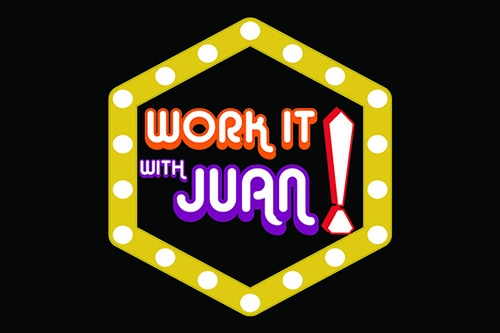
Learn about continuing education units (CEUs): what are they, who needs them and where to get them! View Time: 3:46
PLAY EPISODE
Learn More About: Earning CEUs
What is Professional Development?
To best help our clients, patients and communities, your education in social work shouldn’t end when you receive your diploma. Take advantage of professional development opportunities to stay up-to-date with your practice.
Professional development is a general term that refers to a wide variety of learning opportunities that supplement your formal education. It may include such things as trainings, workshops, seminars, conferences, panel discussions, film screenings and webinars.
It is designed to help you improve your knowledge, skills and work performance while staying current on research and developments in the field. Professional development can also provide you with opportunities to network with other practitioners, as well as help you grow in your career.
While professional development usually refers to learning you receive after your degree, students can also sometimes take advantage of these opportunities as they earn their social work degrees. In fact, many of our professional development events are also open to students!
An Overview of Continuing Education Units (CEUs)
Certain professional development opportunities will offer Continuing Education Units, or CEUs. A CEU is a unit of credit offered by a continuing education “provider” approved by a state licensing board. Providers include accredited schools (like the USC Suzanne Dworak-Peck School of Social Work), associations (like the National Association of Social Workers), or other individuals or entities that offer continuing education activities and meet licensing board requirements. CEUs can be earned in-person or online.
CEUs are vital to Licensed Clinical Social Workers (LCSWs), who are required to complete a certain number of hours of continuing education for licensure renewal to stay current with their practice. The number of hours of continuing education required to maintain a license varies by state. For example, in California, all social work licensees are required to complete 36 hours of continuing education during each two (2)-year license renewal period.
You can receive CEUs by attending events or activities offered by continuing education "providers." Promotional materials for the activity will likely indicate whether CEUs will be offered for attending, and certificates are usually issued as proof that a practitioner has completed CEUs.
The next time you receive promotional materials for a social work event, look to see if it indicates that CEUs will be offered! It will often also state how many credits you will be eligible to earn at the event.
One more thing—and this is very important to remember—if you are eligible to receive CEU credits at an event, you must indicate this when you register or check-in for the event. If you miss this step, you risk losing the opportunity to receive the CEUs with certificate at the completion of the event.
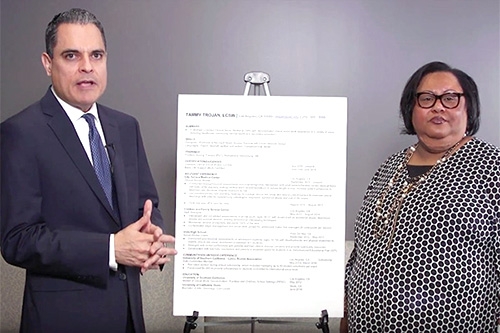
Juan and special guest April Castañeda, MSW ’99 and assistant director for human resources at NASA’s Jet Propulsion Laboratory, address ways to overcome some of the pitfalls of job applications and resumes. View Time: 5:56
PLAY EPISODE
Learn More About: Application & Résumé Tips
WORK IT WITH JUAN Episode 2: Pitfalls of Applications and Resumes
TRANSCRIPT April Castañeda, assistant director for human resources, NASA’s Jet Propulsion Laboratory
April Castañeda is currently the assistant director for human resources at NASA’s Jet Propulsion Laboratory (JPL) where she is responsible for driving HR strategy through innovation, talent management, and directorate partnerships. Prior to JPL, April was the executive director for human resources at the California Institute of Technology (Caltech). Throughout her 17-year career at Caltech, she held a number of leadership positions including senior director for employee and organizational development, director of staff education and career development, and director of consulting services at the Staff and Faculty Consultation Center. April holds a Masters in Social Work (MSW) from the University of Southern California (USC) and a Bachelor of Arts degree from University of California, Los Angeles (UCLA) in Women’s Studies. She has taught graduate courses at the USC Suzanne Dworak-Peck School of Social Work, and is currently a member of the board of Options for Learning, a nonprofit organization which provides early childhood education to low-income families.
How has your relationship/involvement with the USC Suzanne Dworak-Peck School of Social Work helped or influenced you?
APRIL: I graduated with an MSW from USC in 1999. The industrial program was awesome and it totally set me up to go into the industry. My MSW provided me with a great opportunity to really grow at Caltech. I got hired at Caltech where I had my field placement as the manager of their employee assistance program. I then taught at the school for five years – a class on policy, a mezzo-level practice class in the industrial social work program (now called Social Change and Innovation) and a class on leadership.
What are the best ways to overcome or avoid potential issues on a job application, such as gaps in employment?
APRIL: It depends on what the gap in employment is. First, you need to always be honest about the years you worked in places. If there is a long unemployment gap, it is important that you still show you have continued to be involved in activities to keep your skills current. That is the main worry for potential employers - that people are not keeping current and keeping their skills sharp. Activities can include volunteering, providing your expertise, being a speaker, doing a free workshop, of participating on a nonprofit board, etc.
If the gap in employment is due to a maternity/paternity leave or caring for a loved one, you should include this information.
What should you do if you were terminated from employment?
APRIL: The most important thing is to never talk badly about your ex-employer. If you were laid off, you can mention that, or if your entire team transitioned, or the organization was bought out, etc.
If you were terminated, you can write “job ended” or that you transitioned to another job. You can discuss the details of the termination in the interview in a positive light (e. g., it was not a good fit, etc.). Another suggestion is if you are terminated from a position, you can always ask your employer if you can report your parting as a resignation. This can be negotiated with some employers and often employers will be okay with this if you ask them. There is no harm in this for employers.
Again, it is always important to be honest.
What about if you do not have enough experience for the job you are applying for?
APRIL: This is the worst for people who just graduated from school. You should list all projects, internships, summer abroad experiences, student government, field placements, and even jobs that are not related to social work (e. g., waitressing, retail). Include all experiences. The main objective is to show that you have been active and employable.
How should you handle it if you received a DUI?
APRIL: Some employers will not ask about convictions or a DUI until the interview. For example, JPL tells applicants they will have to go through a background check and asks if this is okay with you. At this point, applicants should share information about any convictions or issues that may come up on a background check.
Employers may still hire you if you have a DUI. It depends on whether the job involves driving or not. If it does, then a DUI will not work, but some employers will look at the other circumstances involved if the job does not require driving (e. g., how long ago the DUI was or how many there are). It depends on the industry and if the DUI will affect your ability to work. Some employers might exhibit more flexibility (e. g., substance abuse agencies) but others may not and be more strict, such as if you will be working with kids.
With regard to providing salary history and the new law in California (which may soon also be implemented in other states), how should this be handled?
APRIL: When I was employed at Caltech, it was mandatory to ask for salary history on the application. But I had this removed when I started in human resources, because research showed that asking about salary history always put women at a disadvantage. Personally, I do not care what someone made in the past. What is important is what the salary range is for a particular job. Now, at Caltech, they ask for what salary range you are looking for to see if your salary expectations are aligned with the salary range for the position.
The new law in California that began on January 1, 2018 California states that it is illegal in California to ask an applicant for his/her salary history. You may not base a hiring decision or a new hire's salary on their salary history unless they volunteer their salary history, in which case you may consider it in determining salary. However, the California Fair Pay Act also forbids employers from relying on prior salary, by itself, to justify any disparity in pay. Employers are also required to provide applicants with the pay range for a position upon reasonable request. California and New York usually lead in employment law so this may extend to other states.
If an employer still asks you about salary history on an application, leave it blank. If an employer mentions this in the interview, you can say that you left the question blank because the law in California (or any other state where this is applicable) has changed and you assumed that their application had not been updated yet, so you left if blank. If an employer persists, then you can tell them that it would be more helpful for you to learn if the salary range for the position is what you are looking for. If an employer still make it mandatory to provide your salary history, then provide it, but use this as information to evaluate the employer and decide whether you want to work with them.
What constitutes a good resume?
APRIL: At JPL, we get hundreds of resumes for each of our job openings, as do most organizations, so it is very important that you make it clear and concise.
Your resume is just the start of a conversation. It is like peaking someone’s interest to have a first date. In fact, I once did a workshop on how hiring is like the dating process. Your resume is like your online profile. The employer is thinking, “do I want to email you, get to know you better, send you a smiley face? ” Resumes are like interior decorating. What makes a good resume is personal for everyone.
I prefer chronological resumes because today employers are focused on work experience and this format allows employers to clearly see that. It needs to be organized – do not make a hiring manager have to work hard to gain the information they are seeking. Use data and analytics in your resume if you are able (e. g., number of cases/patients you see annually, budget size you oversee, etc.). Mention relevant experience and add details (e. g., types of therapy you provided, etc.). Proofread, proofread, proofread – I cannot stress this enough. If a hiring manager or employer sees typos in your resume they may think this is the standard of detail they can expect from you during employment and not want to go any further. As always, be honest.
You should have different versions of your resume for the different types of jobs you may apply for. Additionally, identifying keywords in the job description – such as minimum requirements - and then weaving those into your resume is always a good practice to catch a hiring manager or employer’s attention.
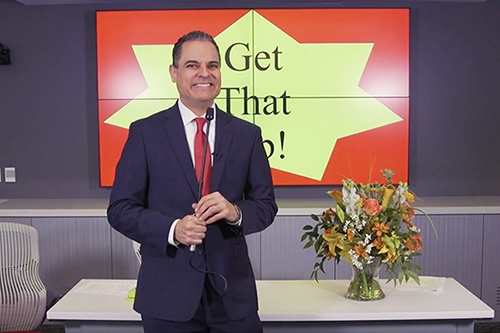
Join host Juan Macias, his lovely assistant Ramona Merchan, MSW ’08, and alum contestants Sean Taitt, MSW ’11, and Nikita Hearns, MSW ’12, as they compete on the new interviewing game show: Get That Job! View Time: 4:43
PLAY EPISODE
Learn More About: Preparing for an Interview
Interviews
A job interview is a conversation between a job applicant and a potential employer. It is an opportunity for the candidate to learn more about the job and the agency or organization, and an opportunity for the employer to learn about the candidate’s personality, character and qualifications for the job. Based on the interview, the employer tries to determine if the candidate is a good match for the job and the agency or organization.
How Can I Prepare for My Interview?
- Know yourself (personality, strengths, areas of growth, skills, interests, career goals).
- Understand your skills and be able to connect them to those for which the employer is looking.
- Know your resume well (education/courses, your field experiences, other work experiences, volunteer experiences).
- In advance of the interview, reflect in-depth on your professional experiences to come up with your go-to answers to common behavioral questions employers commonly ask in interviews. These include describing your experiences with challenging/resistant clients; giving examples of how you approach teamwork and how you handle conflict; and describing projects or programs you have created or led.
- Know clinical risk factors for depression, suicidality, abuse and neglect, substance abuse, etc. to be well-prepared for clinical vignette questions.
- Research the agency or organization you are interviewing with. Know what they do, their mission, their current news and future plans.
- Read and understand the job description.
- Come up with a list of 5 - 7 questions for the employer.
- Contact recent and established alumni who may currently work for the agency or have worked there in the past to get insight into the hiring process and agency culture.
- Practice answering questions out loud with a friend in a mock interview role play. Video or tape record yourself and review.
- Notify references and ask for their permission to give their names as people who are willing to speak on your behalf in regards to your work ethic, overall character, etc.
In preparing for your interview, there may be other kinds of specialized preparation or research that would be helpful to do, depending on the agency or organization. It’s also a great idea to do some reading about trends or recent news or developments in your field in general. Use your instinct and do as much as you can to be prepared. Don’t wing it! Being well-prepared will give you a better chance of impressing the interviewer, and will help keep nervousness in check. You will be more confident walking into an interview with answers ready, and confidence goes a long way.
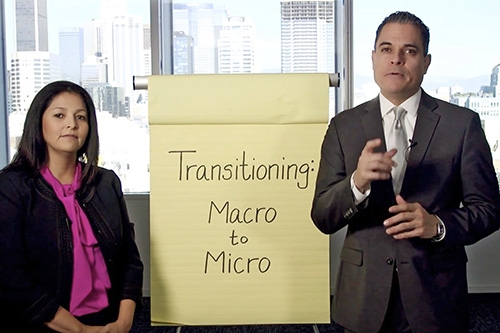
Host Juan Macias discusses job transitioning from micro to macro and macro to micro with special guests Samantha Quintero, MSW '10, and Levonnia Iwuoha, MSW '15. View Time: 4:39
PLAY EPISODE
Learn More About: Job Transitioning
TRANSITIONING FROM A MICRO JOB TO A MACRO JOB:
An Interview with Samantha Quintero, MSW ‘10
Tell us about your background—your time as a student, how you have stayed involved with our school after graduation, and how your relationship with our school has helped or influenced you.
I graduated with my MSW in 2010 from what is now the Social Change and Innovation Department. As a student, I was active in the Latino Social Work Caucus and served as its Community Representative Chair. After graduation, I became a Field Instructor and served in that capacity until 2016. In the Fall of 2017, I joined the Alumni Leadership Council (ALC), a body of alumni leaders that come together to enhance the school’s visibility in a variety of arenas.
relationship with the Alumni Leadership Council has helped me stay connected with professionals at large, and it has allowed me to think more broadly and from the perspective of a variety of different alumni in all stages of their careers. Being involved with the ALC has also allowed me to acquire additional credibility.
My relationship with the school has helped me get more information about what is happening in the field, and about the things our practitioners do which inform my work in the homelessness arena.
Describe your career path and the professional transition you made from a macro position to a clinical position.
After graduation, I was hired at my second-year field placement in the MSW program. For 8 years, I was a program director at UCLA for the Environmental Worker Training Program, which is a workforce development program federally funded by the National Institute of the Environmental Health Sciences. It aims to place underserved populations in the environmental field. As program director, I identified local employers and worked with community college districts to develop training curriculum to prepare workers for the environmental arena. I oversaw project management of retrofitting projects, partnered with City of Los Angeles to recruit community members for environmental jobs and a variety of other projects. This allowed me to find my niche.
I got to a point where I started to reevaluate my career goals, and I left UCLA and started a consulting company, Community Education Training Institute, which worked with the Department of Corrections in matching recently released parolees with environmental companies. I did this for about a year and realized I wanted to get my license. Around the same time, in March 2016, I volunteered for a service project at the Martin Luther King Recuperative Center in Los Angeles as part of the USC Day of SCervice. The Center is a facility where individuals can recover and regain general stability after medical illness.
That day, I attended a motivational workshop in which homeless clients recovering from illnesses shared their stories. It was there that I realized that there are many areas in which I can work to get my licensure hours. I was networking with Brenda Weiwel, the Director of the Homelessness Initiative at USC, and I told her that I would love to work with this population. I gave her my résumé, and she forwarded it to the program manager. Eventually, I was hired!
Did you need further training or qualifications?
I did not need additional training for the transition I made, but it is always a good idea to attend professional development opportunities like workshops and conferences to learn new trends and stay up to date with best practices.
How can job transitioning be good for a person’s career?
It broadens your awareness of other areas of social work, and it can expose you to true interdisciplinary collaboration and help you develop new professional relationships. It can also allow you to grow and get your license. Your overall marketability can be enhanced by the additional versatility, and often you are able to advance financially because you are now connected to a whole network of individuals. For me, it has allowed me to use both my clinical and macro skills, and I like seeing the immediate impact in the work I do now as a micro social worker.
When do you think is the right time for someone to make a job transition?
You have to first determine what your overall professional goals are. If you feel like you are willing to do something different and put in the time to learn all about a new arena, then making the transition can be right for you. After working in a role for a long time, it can be a challenge to then become the new person on a new team, and it may be difficult to learn a new job. You should make sure to pick a time when you will feel well-supported during the change.
How do you sell yourself if you lack the experience for the job you want to transition to?
Highlight your strengths! Everyone has a niche and something unique to offer any employer. Highlight your willingness to learn and be flexible. The MSW background provides you with so much versatility, and you already have the skills to work with a variety of populations. Your past macro experience does prepare you for working with individuals. Finally, networking is very important because it is how you learn to enhance your resources and connect with others to ultimately land a job, It worked for me.
MOVING UP THE LADDER FROM MICRO TO MACRO:
An Interview with Levonnia Iwuoha, MSW ’15
Tell us about your professional background, how you decided to pursue your MSW.
I was a virtual Master's student and my concentration was community organization, planning and administration. I received my degree in December 2015. When I decided to get my masters, I was working full time for Los Angeles County Children Services and had been there for over ten years. I didn't feel I needed a higher degree in social work because of my work experience, plus I was going through a divorce and had two small children. I heard about the USC Virtual Academic Program, however, and called. The lady was so nice and encouraged me to apply as the class schedule was flexible. I took the first step and I am so happy that I did.
In my current position, I am a Resource Family Approval Supervisor with the Department of Children and Family Services (DCFS) in Los Angeles County.
How has your relationship and involvement with our school helped or influenced you?
I am proud to say that I am an alumna and that I graduated with honors—my GPA was a 3.89. I now volunteer on the leadership for the NASW-USC unit. I believe in giving back to my community, and if I can obtain a master 's degree with all that I had going on, anybody can! I want other single mothers at all economic levels to know that it is possible to work, take care of your children, and continue your education.
I have gained so much knowledge and I was so wrong about thinking I didn’t need a higher degree! I really needed to get my MSW because I had no idea what social work really was on the macro level. I didn’t know how policy influences so many services that are implemented in my community. I volunteer on this team and the benefit is that I meet other people who share my passion for helping others in ways I never even knew about. The learning and community of USC never ends. The opportunities are limitless and the experience is priceless.
Describe the professional transition you made from a micro position to a position of greater leadership in the macro space.
I started working for Department of Children and Family Services in Los Angele County (DCFS) in 2001 and have held a variety of positions in DCFS. For five years, I held a variety of micro positions. For example, I was a continuing services caseworker making sure children are successfully placed and get appropriate services. This might mean the child staying in the home or helping them find a “forever family.”
Then I was a dependency investigator worker interviewing families and acting as a liaison between the family and the court, and following that I became a dependency investigation supervisor, which meant that I was now responsible for 5 workers to make sure they are interviewing the families and advocating for their clients with the courts.
I volunteered to become an emergency response supervisor at a time when other supervisors were hesitant because the department was in crisis (e.g., referrals were not being filled, workers were overwhelmed). At this time, everyone wanted to get out of ER and that is when I decided to try it – and it worked! I had no prior experience in ER, but I read the policies and decided I could do this. Ultimately, I excelled in it and I became a leader – to this day, I am still recognized for helping to turn the department around.
I started where each of my workers were and helped take what motivated them and made them want to be a social worker, and then I connected that with the department goals and values. I helped each of them see their role in the big picture—the macro picture. I looked at each worker holistically. At this time, however, I had not started the MSW program and did not know social workers could work in a variety of settings.
I started considering getting my MSW after speaking with a coworker who was a USC MSW alum who told me that USC had an online program. Things were difficult because I was going through a divorce, but the online program gave me the opportunity to pursue a world-class MSW from home. It helped me realize what social work really was and the many different facets of social work. It was magical and took me to the next level of my career. It allowed me to understand policy and macro issues, and it allowed me to answer so many macro questions I had about the department I worked in.
After getting my MSW in 2103, I became a Resource Family Approval Supervisor, where I am now responsible for assessing homes to make sure we are providing adequate homes for children to be placed in.
Why would you recommend transitioning into a macro, management position?
I think it is important to consider moving into management, because as one person, you can only do so much. In a macro position, you can make more of an impact and an influence and have more outreach. You will never lose the micro piece. I still use my micro skills with my workers. The macro is made by different individuals coming together to meet the mission and values of the organization. You can also grow and leave a legacy as a supervisor.
Do you recommend obtaining further education or qualifications?
For many positions, you need to have a master’s degree. My MSW allowed me to get promotions where I worked, and it helped me understand policy. I’m more qualified for more positions now. I definitely recommend it.
When do you think is the right time for someone to make a job transition?
the right time may be when things are not calm at the organization. It may be in crisis, or it may be that new opportunities arise when an organization is making movement and changing. For me personally, changing at this time transformed my whole career.
How do you sell yourself if you lack the experience for the job you want to transition to?
It’s always great to do the research on a position. Preparation is everything. Study the employer’s policies, the employer manual, the website, and then tie that in with whatever your past experience is. Connect their values with yours. For example, you might say, “I see your values are open and honesty. I follow this every day in my life.” And connect your past work experience with the job and department values. Show your willingness to learn by demonstrating the learning and research you have done already. Show your strong work ethic.
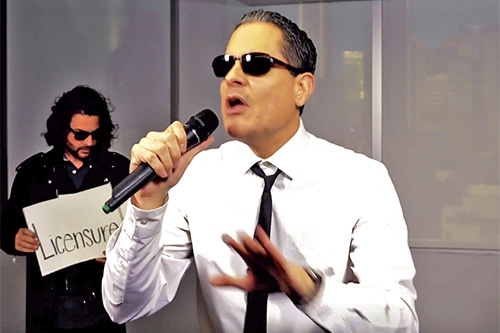
The episode of Work It With Juan you don't want to miss! Host Juan Macias breaks down licensure... and you'll never hear that word the same way again. View Time: 2:34
PLAY EPISODE
Learn More About: Licensure in California and Other States
A Licensed Clinical Social Worker (LCSW) is a social work practitioner who has been approved by a state licensing board to provide comprehensive mental health services and assume greater re-sponsibilities than a social worker who is not licensed. Though the requirements for becoming an LCSW differ by state, aspiring LCSWs must generally earn a Master of Social Work (MSW) de-gree, complete additional coursework and clinical training, and pass licensure exams.
Becoming an LCSW will allow you to practice independently, and it may also afford you more op-portunities to supervise and mentor other social workers, manage agencies, provide consulting to businesses, schools and healthcare organizations, and serve as an expert witness during court cas-es.
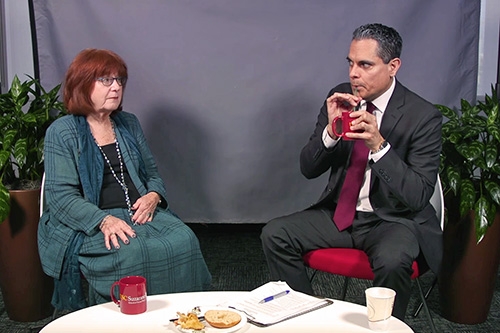
Thinking about starting your own practice? Gain some insider knowledge as host Juan Macias interviews retired USC professor Heather Halperin, who has successfully had her own practice for over 40 years! View Time: 5:48
PLAY EPISODE
Learn More About: Starting Your Own Practice
Full Interview: Heather Halperin’s Advice for the Private Practice Process
Heather Halperin, LCSW, has held a private psychotherapy practice in the San Fernando Valley for 35 years, and was an adjunct clinical associate professor of field studies at the USC Suzanne Dworak-Peck School of Social Work for more than 30 years. She has dedicated her decades-long career to the welfare of children and families, and to the training and education of future social workers.
Q: Please tell us about your professional background, the populations you serve and your specialties.
A. I started my private practice, which is in Encino, California, way back in 1983 with a focus on children and families. However, children have adult parents, and parents are couples, and as the years progressed I began to also see individual adults and couples along with children and families.
I received specialized training at the Southern California Family Therapy Institute, which augmented my psychodynamic educational training. I went through training in Eye Movement Desensitization and Reprocessing (EMDR) Level 1 and 2, Trauma Resiliency Training and, most recently, Brainspotting Level 2. This all occurred along with the USC Suzanne Dworak-Peck School of Social Work’s evidence-based therapy trainings in Motivational Interviewing, Problem Solving Therapy and Cognitive Behavior Therapy, in which I participated as a table trainer, and when I taught these therapies in my VAC Virtual Field Practicum class. This certainly enhanced my knowledge and skills in all these areas.
Currently I am working with families, individual adults, senior clients and very high functioning adolescents struggling with depression and anxiety about their future. I utilize all the theories I have learned through the years, including therapeutic intervention learned from personal growth self-awareness workshops and extensive professional reading and peer supervision groups.
Q. When did you decide to start your own private practice, and how did you start it?
A. I was working at Children's Hospital of Los Angeles (CHLA) as the child abuse social worker during my second period of employment there from 1982 to 1983. (My first employment there was from 1972 to 1978.) I felt myself developing compassion fatigue and burn-out, so I decided to move on from working with child abuse. After much self-exploration, I moved to Scotland, where I lived in a farm cottage and worked as a psychiatric social worker in a psychiatric hospital in a small town of two streets which was 17 miles outside of Edinburgh. After a couple years, I returned to the United States. A few years—and a few other social work jobs—later, I returned to my former job at CHLA. It was while I was there for the second time that I came up with the idea to open a private practice after work and on the weekends.
My idea was based on the social work support I saw residents and MDs receive in outpatient clinics and the hospital. I thought that residents who left the hospital to begin medical practices might have a desire and need for social work support similar to what they had received while at CHLA. I talked with some of the residents with whom I had worked closely, and I realized that all I needed was for one of them to say “yes” to the idea, and that happened.
Dr. Howard Mendelson, who had been a Chief Resident, was now in pediatric medical practice with another MD, Nan Zaitlen, and they both knew me. I met with Howard and indicated I would manage my own billing to patients and would work on the evenings when the medical office was closed. That gave me free access to both the medical consultation rooms and to the waiting room to see families and run groups. Both pediatricians started referring clients to me, and the referrals often involved what they considered my specialty—child abuse or neglect.
My fee was low. Having never charged anyone to see me professionally, I felt embarrassed asking clients for money. I charged $35 for a session, and I was not connected to any insurance company at the time. I hadn’t even considered it.
I remained in that pediatric office until 2004. Over the years, several pediatric MDs came into the practice and left to establish their own practices. Because they knew me, they also became referral sources for me. In 2004 I moved into a pediatric gastroenterologist’s office in the same building complex and remained in his practice for seven years, until that office became too cramped for me. I joined two other therapists in the same building and rented one of the rooms in their suite of offices—I finally had my own room! I have moved a couple times since then, but always in my own space and with my own furniture. I like having my own space, and since I see clients on evenings and weekends, it would not make sense to rent hourly space.
Q. Can you share some tips for those beginning in private practice?
1.Get yourself linked with insurance companies. Many of my colleagues do not accept insurance as they do not want to go through that hassle. As I mentioned previously, I initially had not considered it either. But as a social worker, my commitment is to see those who may not be able to afford the full fee, and I eventually became an insurance provider. I recommend others do so too. Insurance companies refer clients to me, and now I am included as an Employee Assistance Program (EAP) provider. The way I got linked to my first insurance company is interesting: one of our faculty members, John Brekke, is married to an LCSW who is a USC Suzanne Dworak-Peck School of Social Work alumna and whose name—Heather Halpern—is very close to mine. One insurance company thought my practice was another branch of her practice, so they inadvertently included me as a provider. By the time it was all sorted out, they kept me on as a provider separate and apart from her!
2.Having supervision is important. During the late 1980s, I realized being in private practice can be lonely and can lead to you feeling unsupported. I spoke with some of my USC colleagues who also were in private practice and established a peer supervision group. Over the many years, a variety of my colleagues from USC and from the therapy community have participated in this group, which met roughly every 6 weeks for around 30 years. I now have a new peer supervision group with some old and some new therapist colleagues. It’s important to remember that we all need ongoing supervision, even when we are licensed.
3. Have patience and perseverance and try not to panic. When I first started and was only getting referrals from MDs, there were times clients would not return and I would become panicky that I would not get more referrals. This panic was at times unbearable, because although this was not my only source of income, I was finding myself attached to the extra money and especially to the status of having the practice. At one point, I decided that whatever happened I would accept it, but would no longer allow myself the indulgence of this panic. Strangely, once I decided that I would never again bother myself with whether the practice would continue, my referrals never stopped! Over time, clients starting referring me to other clients, who referred others, etc. My practice grew with time.
Q. What are some issues to look out for and challenges to overcome?
A. I think the biggest challenge is asking yourself—and finding the answer to—the initial question: “How can I begin?” Can you start by sharing the office of another therapist, MD or attorney? Where will you get client referrals? One thing that can cause worry is the fear of not getting any, or only very few, referrals, and how to prevent your private practice from dwindling down to too few clients. It is important to consider whether you have a specialty that is desired, whether you speak another language, what kind of training you have or still need to work in a specific area. Do you want to take insurance? How will that work? How time consuming will it be to do the billing? Will you become part of a service that submits your insurance and facilitates all of your notes writing and charting? Where will you get supervision? What will you do if you cannot get clients? Do you have the time to put into multiple efforts to acquire new clients?
Q. What have been the benefits of starting your own private practice?
A. There is the opportunity to make more money than you can make in social work employment, though I always viewed the private practice money as “dessert,” and not as that with which I counted on for making my primary living. More than that, there has been the quality and feeling of being a “grown-up” and independent in the profession, which I have greatly valued and enjoyed.
Q. What final advice would you give anyone considering starting their own private practice?
A. Go for it! Make the plan. You need to consider what it is you want, start with part-time and then build up to full-time, if that is your goal. Do you wish to create a full-time practice? Do you want to become an intern in another LCSW or other mental health practitioner’s practice? All are possible avenues. You need to do your research, talk with others who have opened a private practice and figure out what way best fits who you are. All paths are available. It may not be easy at the beginning, as it is new terrain. Be prepared for that. Also, it can be isolating and lonely to see clients in your own office, back-to-back, with little collegial contact, so consider how that will affect you and plan to build opportunities to connect and interact with others as a professional and in your personal life.
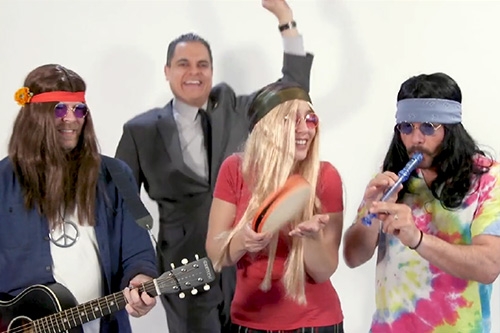
Are you effectively practicing self-care in your daily life? Juan provides helpful tips for social workers and nurses... with assistance from some musical guests.
PLAY EPISODE
Learn More About: Practicing Self-Care
What is burnout?
Burnout is defined as a state of vital exhaustion that is experienced mentally, physically and emotionally. It happens gradually and often imperceptibly to the individual. It often is reflected in a person having chronic fatigue, decreased motivation, enthusiasm and productivity, moodiness, grief, decreased creativity, negative thinking including intense frustration, anger, cynicism and depersonalization. In the later stages, a person may exhibit apathy, withdrawal, despair, and a sense of failure and worthlessness.
How is stress different from burnout?
In and of itself, stress is not a bad thing. Some amount of stress is necessary to motivate and get us focused. However, our bodies, unlike machines, are designed to work in short bursts, which are also referred to as “pulses.” Experts in this field suggest that our most basic need is to spend and renew energy. We are hardwired to make waves—to be alert during the day and sleep at night; to work at high intensity for limited periods of time and then to rest and refuel.
Instead, however, most of lead increasingly linear lives. We are frequently spending down our energy without fully, or effectively, renewing it. It is because of this that so many of us experience stress as a chronic state. Over time the stresses of the demands that we experience in our personal and work lives outpace the resources that we have available to us. These resources are things like control, social support, autonomy, decision involvement and coping skills. Burnout is an individual’s physiological and psychological response to chronic levels of high stress, resulting in a state of extreme exhaustion that is felt physically, mentally and emotionally.
What are some possible drivers of stress and burnout?
We all have multiple roles we play in our lives, such as employee, partner, parent, child, sibling, neighbor, etc. Associated with each role are a set of expectations and behaviors that we hold for ourselves, and for others, in relation to that role. At its most fundamental level, burnout means that there is a disparity between what is expected from a role and what is achieved or what reward is received.
While some people are more vulnerable than others to experience burnout, research suggests that it is most prominently an organizationally-caused phenomenon, as opposed to being simply an individual problem. Some organizational contributors to the incidence of burnout include unsupportive supervisors or management; excessive workload, including high client/patient ratios, “doing more with less” and overloading the most capable with more work; shifting or conflicting priorities; working with insufficient reward (i.e. money, status, positive feedback and appreciation); working with little agency or control (i.e. decision-making, input or choice); digital overload and multi-tasking; and little social support or a breakdown in community, including a decrease in job security, a focus on short-term goals that exclude consideration for people, loss of a sense of “belonging,” high levels of conflict, incivility and distrust, working in an unjust environment or in an organization with whose values you are in conflict with.
What can social workers and nurses do to reduce stress and burnout?
The opposite of burnout is engagement, and this is done by having not just habits, but rituals for renewing oneself. Ask yourself and be clear and connected to whether you have risk factors, such as perfectionism, excessively high self-expectations, work-life imbalance, low assertiveness, work overload, lack of agency, values conflicts or poor social support. If you find that you do have one or more of these risk factors, work to actively bolster and expand your protective factors, which support renewal and engagement. This is critical for people in demanding, caregiving fields.
What are some specific things social workers and nurses can do to engage in self-care and bolster protective factors, including options that do not cost anything?
Check your expectations of yourself and of your organization and its leadership. Seek to moderate expectations that are causing significant disappointment, anger or frustration in yourself and in others. There are some good assessments available that can help a person clarify his or her stress and burnout vulnerability, and identify areas to target and support with protective factors. Talking to a safe and trusted person is so helpful, whether it’s a co-worker who understands the rigors of your work role or a professional. If your organization has an employee assistance program, this would be an excellent and free supportive resource to identify goals in service of mitigating the impact of your work role stressors, and to enhance your protective factors.
Of course, taking time for yourself is not always easy, but it is essential. It might be as simple as taking regular walks, sitting quietly or talking with trusted friends or family members. The dimensions of renewal that we want to attend to are physical, emotional, mental and spiritual. It’s not uncommon for busy professionals in helping fields to have not developed habits or rituals for their ownself-care in these critical dimensions of energy management. Working in these demanding human service roles require us to not subjugate our self-care needs. We just have to get better at doing it with the understanding that our clients, patients and loved ones will also benefit from our taking good care of ourselves.
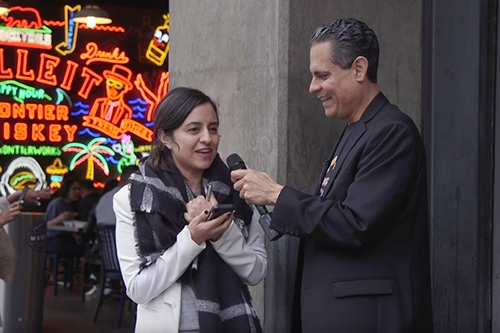
Juan hits the streets of downtown Los Angeles to ask people what they know about an important tool for job seekers.
PLAY Episode
Learn More About: Networking for Job Seekers
What is networking?
The term “networking” refers to the activity of connecting with others, in-person or online, to exchange information, contacts and experience for professional or social purposes. It can take place at social events, alumni mixers, workshops, professional associate conferences and many other kinds of events.
Networking is, in fact, one of the most important activities job seekers shouldmaster in order to be truly successful in their job search. Up to 80% of available jobs are neveradvertised, so job seekers need to have a network of contacts who can provide support, information and job leads.
Why is networking so important?
- It gives you far greater access to opportunities than you would have without doing any networking. According to the U.S. Department of Labor, networking accounts for at least 69% of all annual hires!
- It increases your chances of becoming a referral and getting introduced to hiring managers. Personal introductions are the most powerful way to be pre-qualified as a candidate.
- It offers you a competitive edge when people in your network provide you with guidance and “in-the-know” information about what might be important to review for an interview at an organization they have knowledge of.
Why is it important to not depend solely on employment websites for your job search?
These days, many jobs are posted online, where the competition is fiercer than ever. Recruiters and hiring managers can receive hundreds of resumes for an open position. Additionally, many times employers may have a candidate already identified prior to the posting of the job. To face this challenging landscape, you need to find a way to stand out. With good networking, you can become a referral beforeyou even submit that online application. No more wasting time hitting “send” and never hearing back.
Who is already in my network?
Your co-workers, classmates, professors, field instructors, professionals you meet at social events, neighbors, friends and family members are all part of your professional network, and many organizations have LinkedIn and Facebook pages, which are great places to start connecting with people with whom you share commonalities.
How can I utilize the Trojan Network?
- USC Career Network: It’s no secret that Trojans like to help other Trojans. Speak with USC alumni who have volunteered to provide you with career advice and network.
- connectSC: Get information for Trojan alumni on jobs, employers, USC career center services, workshops, events and programs via this online portal.
- USC Alumni Association groups: Meet Trojans who can refer you to employers and share information about jobs and organizations.
- LinkedIn and Facebook groups: Connect with Trojan professionals and groups online to get insider information on jobs not yet posted elsewhere.
- Fight Online event calendar: Strengthen your ties to the Trojan network by attending an event near you. There are USC alumni events all over the world!
- How do I introduce myself to someone I want to network with?
One tool people use to introduce themselves is their “elevator speech”—a 30-second overview about their knowledge, skills and accomplishments. This short sound bite allows you to briefly and powerfully introduce yourself to a professional you have just met. Below is a general example of an elevator speech, which is meant to give you ideas. Feel free to adjust your delivery for the given situation (e.g., you may not give all of your own speech at one time).
“Hello, my name is ________. I am a social work professional with over five years experience in (mention skills/key words). I am currently (give job title/company) or (in transition). I was previously at ________. I have (mention skills/keywords and achievements).”
NOTE: Remember that this is a two-way conversation, and it should flow freely. The above are just suggestions of how you can start or integrate discussion about yourself into the conversation.
After I give my elevator speech, what else should I say?
• After you give your introduction, remember to, in turn, ask the person what theydo and look for commonalities. Ask about their expertise, their current position, etc. Feel free to comment on similarities.
• When you are getting ready to close the conversation, thank them and ask to exchange contact information so that you can follow up with them.
How Should I Follow-Up?
Send a follow-up email expressing your appreciation for your initial conversation with them, and begin to build your professional relationship with them by:
- Sharing some additional ideas pertaining to topics you discussed during the first conversation.
- Offering something of professional value to them. This could be connecting them to people you know, discussing a resource you have found helpful, sharing a link to an article relevant to their field, extending an invitation to a professional event, providing information about a professional group, etc. Utilize your assessment and resource identification skills to identify ways you can assist them.
- Asking if they would be willing to have a follow-up conversation in which you interview them to learn how they got started, or more about a particular industry, job or organization.
- Eventually and when appropriate, discussing how you can help each other and asking if they know of any job leads, being sure to share any leads you may have for them. Be specific.
Ultimately, whether you are actively looking for a new job or not, it is important to be networking, making connections and building professional relationships on a regular basis during your career. Always be looking for ways to provide value to others and be someone your colleagues trust, rely on for expertise and want to touch base with regularly. This will lead to referrals and unexpected opportunities in the “hidden job market” that you should be ready to seize!
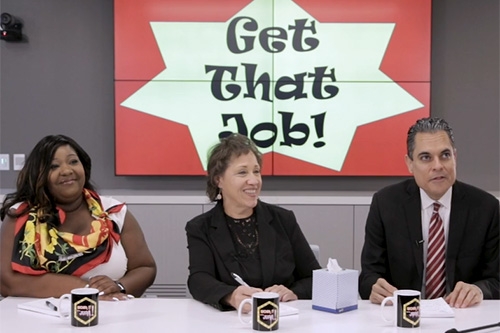
Juan Macias is joined by guest judges Ramona Merchan, MSW '08, and Nikita Hearns, MSW '12, as four alums (Anil Arora, MSW '17, Alex Schwartz, MSW '18, Victor Alcala, MSW '00, Tasha Stiger, MSW '04) compete to see whose fashion sense is best for an interview.
PLAY EPISODE
Learn More About: Dressing For an Interview
Because first impressions are so important, being very intentional about what you wear to a job interview is vital to helping you get that job! While it is most important to effectively demonstrate how your skills and experience are a perfect fit for the job you are interviewing for, wearing the wrong attire can distract the interviewer from hearing how you are great match for their open position.
If you are not appropriately dressed for an interview, an employer may actually draw incorrect conclusions about your ability to do the job and fit into their organizational culture, which will likely lead to them selecting another candidate. So what guidelines should you consider as you get ready for your next job interview?
Women:
- Dark, solid colored, two-piece suit with neatly pressed pants or knee length skirt and tailored blouse.
- If employer suggests dressing casual for the interview, wear business casual attire, which includes khaki or cotton pants or knee length skirt with tailored blouse.
- Minimal/moderate make-up that is natural-looking; minimal or no perfume; neutral or no nail polish
- Simple and minimal accessories and jewelry—earrings should not be dangling far below ear lobes; necklaces should not be too large.
- Dark, closed-toe shoes that match your suit and have no more than a 2-inch heel.
- Hairthat is simply styled and does not obscure your face; there are many ideas online for professional hairstyles for all hair types and lengths.
Men:
- Dark, solid colored, two-piece suit with neatly pressed pants, long-sleeve white or light colored shirt and simple tie.
- If employer suggests dressing casual to the interview, wear business casual attire, which includes khaki or cotton pants or dress slacksand a long-sleeve shirt (tie can be optional).
- Tie pattern should be simple—no loud colors or design.
- Dark, closed-toe, leather/dressy shoes that match your suit; dark socks.
- Minimal jewelry and cologne.
- Hair that is simply styled and neat.
Tattoos and piercings:
- Err on the side of caution. Even if employers are less conservative, consider covering up tattoos and piercings.
- Ask about tattoo and piercing policies once you are offered the position and decide if the policies work for you.
Because you will never really know what the interviewer’s biases may be, it is a good idea to dress on the conservative side when getting ready for an interview. You want to ensure employers focus on your skills and experience, not on what you are wearing. It is also a good idea to “dress up” instead of “dress down,” as most employers will never penalize you for dressing up, regardless of their organization’s day-to-day dress code. Once you are hired, you can always adjust your attire to be more casual if that better matches your new employer’s dress code and culture. It is a smart move to dress professionally because it will allow employers the opportunity to see how you would present yourself in the community as a representative of their organization, even if the position you are applying for is not forward-facing. Maybe when you get promoted, it
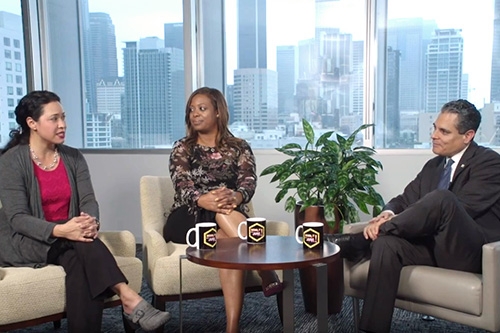
Have you ever thought about taking a leave from the workforce? Juan speaks with MSW and MSN alums who have done this, and learns some tips for making a successful reentry. View Time: 7:28
PLAY Episode
Learn More About: Reentering the Workforce
Many professionals take a planned break from the workforce for an extended period of time for a variety of reasons, including starting a family, working as a stay-at-home parent, caring for a loved one, or going back to school for a degree or new training to advance a career. Regardless of the reason, reentering the workforce may seem daunting after an extended break, but it doesn’t have to be!
Though it can be a difficult decision to make, leaving and reentering your profession can be done successfully. Read below to hear two alumnae describe how they did it.
Michele Kolostian, RN ‘04, MSN, GNP-BC
What prompted you to take time away from the workforce?
The first time I left the workforce was for 6 months after the birth of my first child. I stayed with the same company as a nurse practitioner but changed my position to part-time upon returning. The next time I left the workforce was for 9 months after the birth of my second child. I left the company because this coincided with another major change in our lives, which was relocating to another city. I decided to leave the workforce for many months rather than take family leave, because I wanted extra time to bond with my babies. I know that is not an option for some parents, but thankfully it was an option for me and I am grateful. The last time I took time away from work was to care for my ill father. Besides having end-stage cancer, he fell and suffered a broken hip. I felt it was my duty to care for him, and I resigned from the company I was working for at that time since they could not offer me a part-time position. They suggested I take family leave and then return, but at that time of life I needed a part-time position in order to take care of my father.
What did you enjoy, and what challenges did you face, during your time away?
During these periods off, I really relished the time with my babies. I did not have to worry that they were at a daycare facility or with a babysitter during early infancy. The challenge during that time was that our household went from two income earners to one earner, so we had to adjust our expectations of what we could and could not afford. During the time I took off work for my father, I took him to all his doctor appointments and met with home health and hospice staff. I wanted to be involved in his healthcare because in the past, he could not always fully explain to me what happened with his medical care when he was seen alone. I was a quintessential member of the “Sandwich Generation,”the term used for people who are “sandwiched”—or, challenged—taking care of both elderly parents and young children, and when I was out of the workforce, I had more of the time I needed to care for all of them, and thus I felt less stress and pressure with the demands of splitting my time between my own family and my father.
How did you transition back into the workforce?
Being a nurse practitioner, there were many job openings. However, I wanted to return part-time, so that was what I focused on with the job search. There were not as many part-time openings compared to full-time positions, so it took me longer to find a job.
Were there any challenges you encountered reentering the workforce?
When I reentered the workforce after my second child, I was an adjunct professor at a university. This was a different role than a nurse practitioner, and it was very challenging for me at that time because I brought paperwork home, such as grading papers, and this did not go well with having a needy baby.
What did you do to find another job, and how did you handle interview questions about any gaps in your resume?
Searching online with reputable headhunting websites was very helpful. Once I registered on these sites, I received several emails weekly about new Nurse Practitioner job postings. Sometimes I even received phone calls from recruiters. The gaps in my resume were not difficult to explain as due to childbirth or caring for an ill parent. I think I did not have any huge challenges reentering the workforce because I was never gone for more than 12 months, but people I know who have had longer gaps in their resumes have had volunteering and other types of community service looked on favorably, even though they were non-paid positions.
What were your “learnings” from your experiences leaving and reentering the workforce?
I’ve learned that the whole family dynamics change. For example, my children had to adjust to me not being a full-time mom anymore, and that meant there were days that I just could not get it together to cook a meal after being gone all day for work. I’ve also learned to try to be patient and kind with myself as I find a good work-life balance.
Was it a good decision for you to leave the workforce? Why?
Yes, it was very good for me to take time away, because my children will only be babies once and the bonding experience was so important. It was an honor taking care of my father during his illness and especially during his last months before he died. I am blessed in that I have a spouse who was able to take on the financial burdens without me working, and I am grateful. Additionally, it was a good decision to take a break, because I was beginning to suffer major burnout with my jobs, so this was a good time to re-charge and be excited for my next job.
What tips would you offer to someone contemplating taking time away from the workforce to return to school to pursue a graduate degree, or to anyone changing careers?
I would advise people to stay current with their profession by attending seminars and conferences. Continue with earning CEUs in order to fulfill requirements to renew your professional license. Continue to network with people and events in your field. You may want to consider changing fields within the same profession—for example, I tried positions in academia and research. You may want to go back to school or be something entirely different. It is a personal decision to leave the workforce for whatever reasons, and there is no right or wrong decision, as long it makes sense for you and your family at that time in your life. Lastly, if one is leaving the workforce due to burnout, I believe this is just as goodas any reason to take time off and care for one’s well-being!
Natasha Cole, MSW ‘15, ASW
What prompted you to take time away from the workforce?
After my divorce, I made the decision to go back to school to further my education. I had been at my current job for 11 years and had made several attempts to leave and work in the field of social work, however, all of the positions that were of interest to me required an MSW.
What did you enjoy, and what challenges did you face, during your time away?
I thoroughly enjoyed my journey of returning to school, though it presented some challenges. I consider myself to be a non-traditional student. I was the head of household, so all financial responsibilities were my obligation. I had to quit my job of 11 years and I had no idea how I would manage financially without a job. Of course, as the saying goes, “what’smeant to be, will be.” Everything worked itself out. I made lifelong friends in my MSW program. I enjoyed the campus and my professors, and the friendships formed. Once I started working as a social worker, I felt very prepared and competent.
How did you transition back into the workforce?
My first job was working with homeless veterans. I thought I would have the entire summer off to enjoy and relax after all of my hard work, but I was hired 2 weeks after graduation!
What were your “learnings” from your experience pursuing the MSW and reentering the workforce?
Through the challenges of going to school, working, managing an internship and having a daughter, I learned that I am resilient. I learned to open my mind and my views and to embrace all that the program had to offer. I also learned that having a Master’s in Social Work opens so many doors.
Was it a good decision for you to leave your job to pursue your MSW to ultimately change careers?
Yes, my decision to leave my job was the ABSOLUTE best decision ever! After my divorce, I needed to increase my monthly income. Having an MSW has opened up doors that would have never opened.
What tips would you offer to someone contemplating taking time away from the workforce to return to school to pursue a graduate degree, or to anyone changing careers?
Your degree can be a career changer or a career enhancer. If you are opting to return part-time while working full-time, limit your course load to one or two per semester. I started the pro-gram while still working full-time. I appreciate USC for having the 3-yr part-time program. Al-so, get to know your classmates—chat with them during class breaks and join study groups when you can. These are the people who, when you’re stuck on a project or having trouble un-derstanding a concept, can help and can share their notes if you have to miss a class. In addi-tion, they’ll be graduating and moving on and may become important contacts out in the work-force.
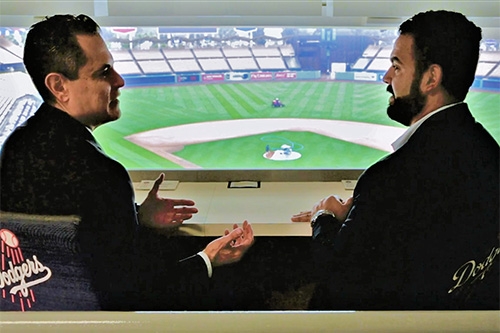
Interested in practicing social work in a nontraditional setting? Then this is the Work It With Juan episode for you! Catch host Juan Macias and alumnus James Lopez, MSW '16, at Dodger Stadium.
PLAY Episode
Learn More About: Social Work in Non-Traditional Settings
MSWs are at Work in Non-Traditional, Unconventional and Unexpected Places
Many social workers use their transferable skills in industries, organizations and departments that you may not think ordinarily hire social workers. They are at work in financial services, entertainment, insurance, trust management, fund development, marketing, community relations/public affairs, quality improvement, human resources, organizational effectiveness and administration, to name a handful.
Social workers can be effective in many settings because they are trained in “systems thinking,” as they offer a unique multi-dimensional perspective that takes into account psychological theory and environmental influencers in assessing problems, addressing root causes and identifying solutions. Social workers also offer extensive knowledge of human behavior, motivation and interpersonal relationships, and they possess strong research, analytical and problem-solving skills, which makes them to very valuable to any organization.
What Important Transferable Skills do Social Workers Bring to Non-Traditional Settings?
- Multidimensional assessment and problem solving
- Relationship management
- Program development and evaluation
- Process improvement
- Project management
- Market research
- Fund development
- Community relations and outreach
- Leveraging resources and relationships
- Keen understanding of diverse populations
- Consensus/team building
Some of the Places USC Suzanne Dworak-Peck School of Social Work Alumni are Employed
- Accredited Home Health
- Amazon
- Los Angeles Dodgers Foundation
- NASA Jet Propulsion Laboratory
- PriceWaterhouseCoopers (PwC) Consulting
- Tesla
- United States House of Representatives
- Warner Bros. Entertainment
- Wells Fargo Life Management Services
If you would like to explore social work in non-traditional settings, make an appointmentto speak with one of our career counselors.
Additional Reading
Why Companies Need to Hire Social Workers - In this June 2018 Fast Companyarticle,alumna Mia Bennet, MSW ’10, and Professor Michàlle Mor Barakdiscuss how developments within corporations are broadening the need for experts in societal good, and how universities and colleges are asking social work students to consider careers in the private sector.
Alumni Thrive in Non-Traditional Social Work Jobs - This article explores some of the skills that MSWs bring to various jobs and how social workers are able to make organizational impacts in non-traditional settings.
Why Private Companies are Taking on Social Workers - In this 2014 op-ed in The Guardian, AssociateDirector of Alumni Career and Professional Development Juan Macias discusses the value of social workers in the workplace and the range of issues they can help employers address.

It’s a special holiday episode of Work It With Juan! Juan spreads a little holiday magic as he visits his friend Linda Snouffer, program manager for Employee Assistance and Worklife Services, who is on assignment at the North Pole, assisting one of Santa’s Helpers with some emotional intelligence issues.
PLAY Episode
Learn More About: Emotional Intelligence in Social Work
What is Emotional Intelligence?
Emotional Intelligence (EI) is a form a social intelligence that involves the ability to recognize, understand and manage our own emotions, and the ability to recognize, understand and influence the emotions of others. In practical terms, this means being aware that emotions can drive our behavior and impact people (positively and negatively), and learning how to manage those emotions – both our own and others –especially when we are under pressure.
The 5 Categories of Emotional Intelligence
- Self-awareness: If a person has a healthy sense of self-awareness, sheunderstandsher own strengths and weaknesses, as well as how her actions affect others. A person who is self-aware is usually better able to handle and learn from constructive criticism than one who is not.
- Self-regulation:A person with high emotional intelligence can maturely reveal his emotions and exercise restraint when needed. Instead of squelching his feelings, he expresses them with restraint and control.
- Motivation:Emotionally intelligent people are self-motivated. They are not motivated simply by money or a title. They are usually resilient and optimistic when they encounter disappointment and driven by an inner ambition.
- Empathy: A person who has empathy has compassion and an understanding of human nature that allows her to connect with other people on an emotional level. The ability to empathize allows a person to provide great service and respond genuinely to others’ concerns.
- People skills: People who are emotionally intelligent are able to build rapport and trust quickly with others on their teams. They avoid power struggles and backstabbing. They usually enjoy other people and have the respect of others around them.
Why Is Emotional Intelligence (EI) Importantin Social Work?
Emotions and power relationships are central to social work, so emotional intelligence is especially relevant to the profession. Social workers need to consider their own personal responses when working with clients, and possessing empathy is particularly important in contributing to occupational success for a social worker, as it is pivotal in gaining the trust of clients and cooperation of other colleagues. Social workers are also exposed to work-related stress and burnout, so it is important that they are able to recognize, understand and manage their own emotions appropriately in their position. Ultimately, if emotional intelligence is not valued in social work practice, it will become routinized, one-dimensional and lacking inthe depth that a social work requires.
Examples of Emotional Intelligence in Use in Social Work
- During assessment
- Helping people who are experiencing difficulties relating to self and to others
- Providing advocacy and mediation for people experiencing discrimination
- Helping people hold and contain anxiety in times of transition or crisis
- Creating a foundation for capacity building
- Before a social worker can understand the power of emotion in the life of the client, it is necessary to discover its importance in the worker’s own experience
Strategies for Improving Emotional Intelligence in Social Workers
- Listening and building empathy
- Understanding the effects of non-verbal communication
- Fostering self-awareness about how working with clients may affect a worker emotionally and how they can seek help when necessary
- Conducting emotional intelligence training for social workers
- Incorporating training and follow-ups into supervision systems that will improve the transfer of training into practice
- Realistic workloads
- Good administrative support and reflective supervision to talk about experiences and improve the way they work
Additional Reading
Deleon, M. (2015, May 8). The Importance of Emotional Intelligence at Work. Entrepreneur. Retrieved April 16, 2018 from https://www.entrepreneur.com/article/245755
Goleman, D. (1996). Emotional Intelligence: Why It Can Matter More Than IQ, London, Bloomsbury.
Ingram, R. (2013). Emotions, social work practice and supervision: an uneasy alliance? Journal of Social Work Practice, 27(1), 5-19.
Mayer, J.D., Dipaolo, M.T. & Salovey, P. (1990). Perceiving affective content in ambiguous visual stimuli: a component of emotional intelligence, Journal of Personality Assessment, 54, 772-781.
Morrison, T. (2007). Emotional Intelligence, emotion and social work: context, characteristics, complications and contribution. British Journal of Social Work, 37,245-263.
Salovey, P., Mayer, J. (1990). Emotional Intelligence, Imagination, Cognition, and Personality, 9(3), 185-211.